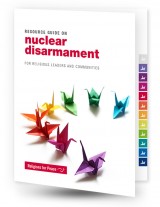Nuclear weapons pose an existential threat to humanity, say religious leaders
Religious believers must act to bridge the political divides that fuel the nuclear arms race
Religions for Peace, at its annual assembly in Vienna 20-22 Nov 2013, declared the use of nuclear weapons and other weapons of mass destruction as immoral and launched a Nuclear Disarmament Resource Guide for Religious Leaders and Communities. (Also published in Arabic, French, German, Japanese and Spanish).
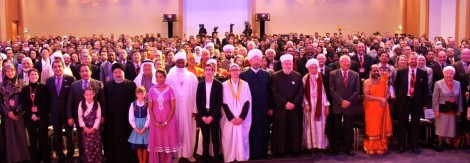
Religious leaders at the 9th Annual Assembly of Religions for Peace in Vienna
The Resource Guide focuses on the special roles of religious believers, including women and youth, and the positive actions they can take to break down the walls of nuclear terror and build the cooperative human security for a nuclear weapon free world. It includes sections on the growing nuclear threat, the economic and environmental costs of nuclear weapons, ethical and religious perspectives on nuclear weapons, diplomatic opportunities to achieve a nuclear-weapon-free world, roles of youth and women, examples of actions by religious communities, useful resources including inspiring videos, and contacts for nuclear abolition organisations.
The Resource Guide was given to every participant at the assembly to take back to their countries and religious communities in order to activate this key constituency – in fact the majority of people in the world belong to a religious faith and could be inspired into action by this resource.
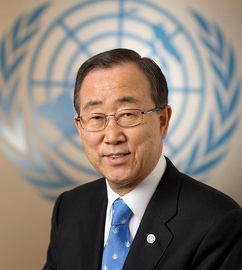
Message by Ban Ki-moon, Secretary-General of the United Nations, for the UN launch of the Nuclear Disarmament Resource
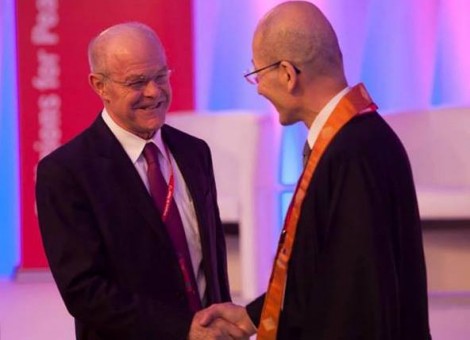
Dr Vendley with Rev Sugitani who spoke at the Religions for Peace Assembly in Vienna
Rev. Gijun Sugitani, Chair of the Religions for Peace International Standing Committee on Disarmament and Security, speaking at the launch of the Resource Guide reminded delegates of the call from the Hibakusha – the survivors from nuclear weapons use – that nuclear weapons must never be used again. The only way to prevent the use of nuclear weapons, by accident, miscalculation or intent, is to prohibit and eliminate these weapons of horror.
Nuclear weapons are threats to all life forms; it is not an exaggeration to say that nuclear weapons threaten national security, rather than protect it.Rev Sugitani, Comments on the launch of the Nuclear Disarmament Resource Guide, Vienna 20 Nov 2013
The Resource Guide notes that nuclear weapons have not been used in wartime since 1945, but the possibility of their use grows daily with nuclear proliferation and an increasingly multi-polar world. And even if nuclear weapons are not used, the production, testing and threat of use of nuclear weapons steal resources from the poor ($100 billion annually is spent on nuclear weapons) and create horriifc health and environmental impacts lasting for generations.
Now we have this problem of what we call “jelly-fish babies.” These babies are born like jelly-fish. They have no eyes. They have no heads. They have no arms. They have no legs. They do not shape like human beings at all. When they die they are buried right away. A lot of times they don’t allow the mother to see this kind of baby because she will go crazy. It is too inhumane.Darlene Keju-Johnson, Director of Family Planning 1987–1992, Marshall Islands, on the impact of U.S. nuclear testing in the Marshall Islands. Religions for Peace Nuclear Disarmament Resource Guide
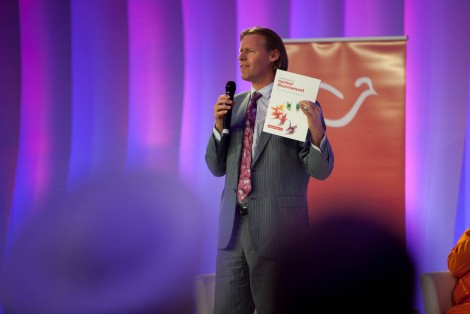
Alyn Ware launching the Nuclear Disarmament Resource Guide. Photo|Sandeep Virdee
Alyn Ware, principal author of the Resource Guide, noted that ‘There is now a global consensus that a nuclear weapon free world is a necessary global good to ensure humanity’s survival, but governments are unable to achieve this goal by themselves as they still focus on national security through military means rather than on human and cooperative security.’
We must remind policymakers and public that we all share an interconnected world that requires cooperative security based on our common concerns, shared moral values and international law. The threat of annihilation is a false security. Nuclear abolition is a common global good which could foster peace by liberating billions of dollars for sustainable development, remove the “Sword of Damocles” hanging over our heads and foster the common search for collective security.Dr. William F. Vendley, Secretary General, Religions for Peace
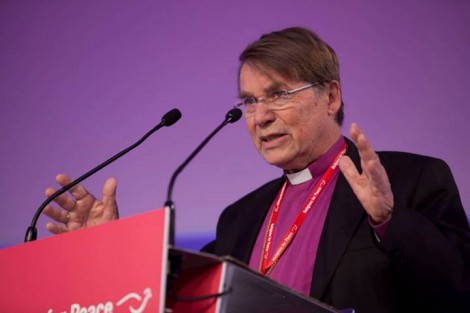
Bishop Gunnar Stålsett speaking just before the launch of the Resource Guide
The Resource Guide includes inspiring quotes from some of the leading participants at the Religions for Peace Assembly in Vienna and other Religions for Peace leaders
There is a growing convergence of ethical and religious perspectives on nuclear arms as a threat to humanity and life on earth. The use of weapons of mass destruction violates the understanding of God as the Creator of the universe and of all human beings.Bishop Gunnar Stålsett, Bishop Emeritus of Oslo, and Member, Nobel Peace Prize Committee, Norway, and RfP International Executive Committee Member
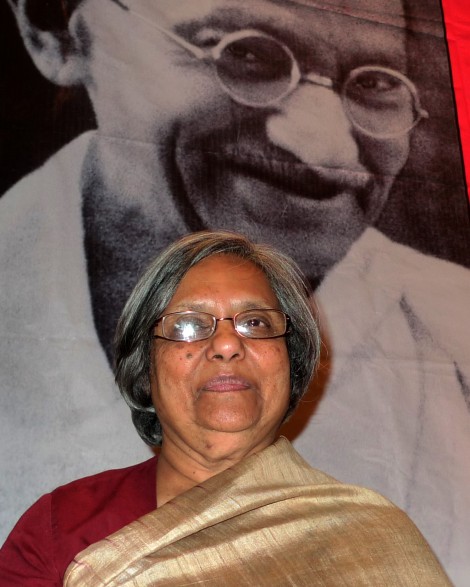
Honorable Ela Gandhi, Founder, Gandhi Development Trust; Granddaughter of Mahatma Gandhi
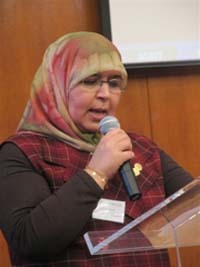
Honorable Mehrézia Labidi-Maiza, Member of Parliament, Republic of Tunisia, and Coordinator, Religions for Peace Global Women of Faith Network
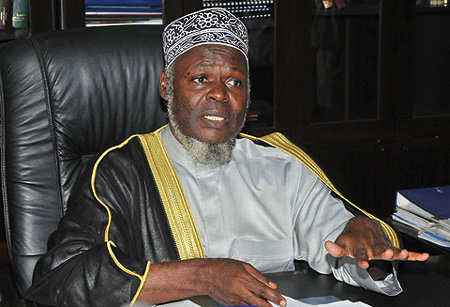
H. E. Sheikh Shaban Mubajje, Grand Mufti, Uganda Muslim Supreme Council, and Co-Moderator, African Council of Religious Leaders-RfP
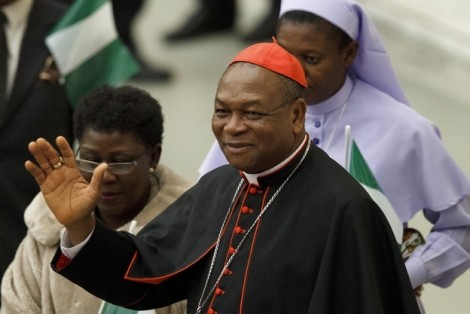
H. E. John Cardinal Onaiyekan, Archbishop of Abuja, Nigeria, and Co-Moderator, African Council of Religious Leaders-RfP
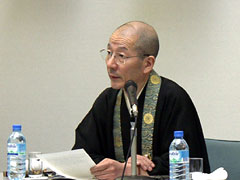
Rev. Gijun Sugitani, Chair, RfP International Standing Committee on Disarmament and Security
To obtain more copies of the Resource Guide or for further information contact:
Alyn Ware, Basel Peace Office. alyn@pnnd.org
Deepika Singh, Religions for Peace Secretariat. dsingh@religionsforpeace.org
Click here to see more photos of the 9th Annual Assembly of Religions for Peace
